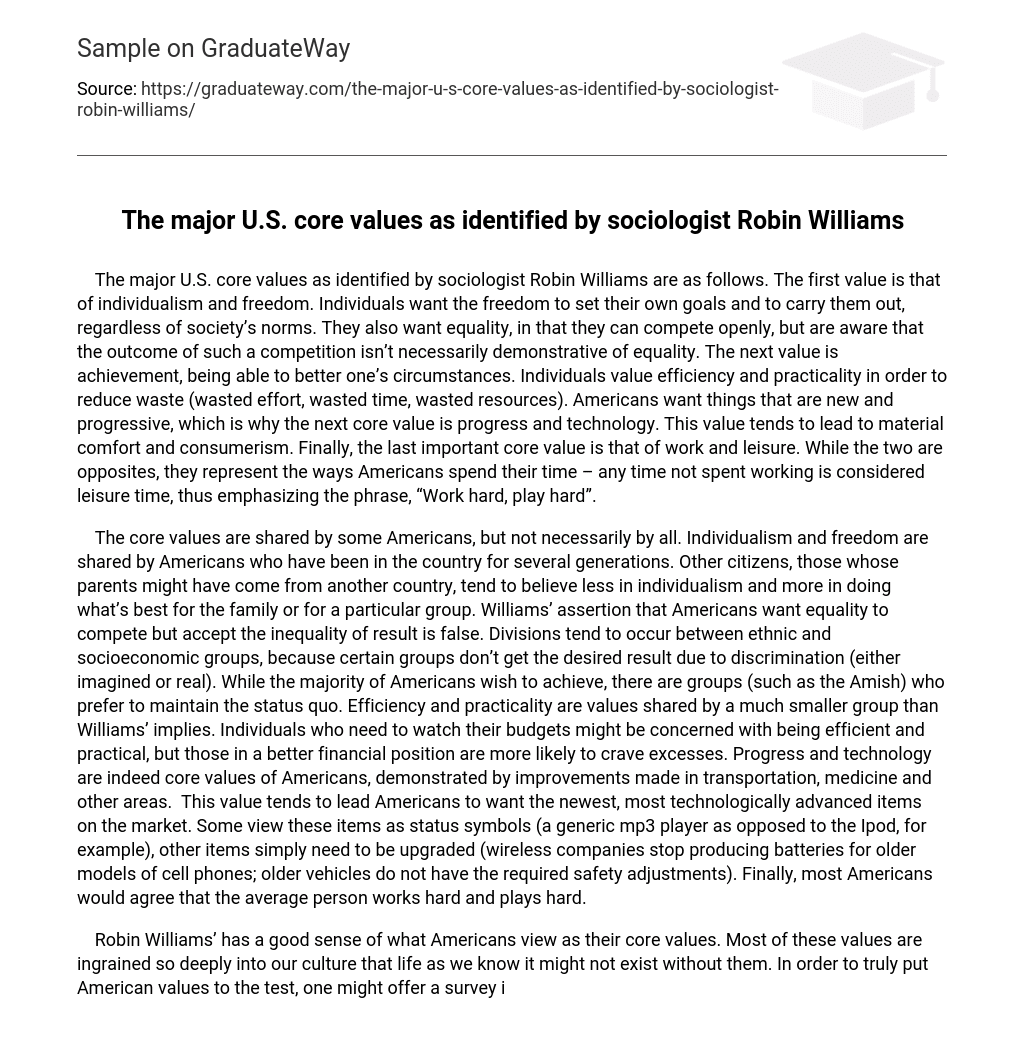The major U.S. core values as identified by sociologist Robin Williams are as follows. The first value is that of individualism and freedom. Individuals want the freedom to set their own goals and to carry them out, regardless of society’s norms. They also want equality, in that they can compete openly, but are aware that the outcome of such a competition isn’t necessarily demonstrative of equality. The next value is achievement, being able to better one’s circumstances. Individuals value efficiency and practicality in order to reduce waste (wasted effort, wasted time, wasted resources). Americans want things that are new and progressive, which is why the next core value is progress and technology. This value tends to lead to material comfort and consumerism. Finally, the last important core value is that of work and leisure. While the two are opposites, they represent the ways Americans spend their time – any time not spent working is considered leisure time, thus emphasizing the phrase, “Work hard, play hard”.
The core values are shared by some Americans, but not necessarily by all. Individualism and freedom are shared by Americans who have been in the country for several generations. Other citizens, those whose parents might have come from another country, tend to believe less in individualism and more in doing what’s best for the family or for a particular group. Williams’ assertion that Americans want equality to compete but accept the inequality of result is false. Divisions tend to occur between ethnic and socioeconomic groups, because certain groups don’t get the desired result due to discrimination (either imagined or real). While the majority of Americans wish to achieve, there are groups (such as the Amish) who prefer to maintain the status quo. Efficiency and practicality are values shared by a much smaller group than Williams’ implies. Individuals who need to watch their budgets might be concerned with being efficient and practical, but those in a better financial position are more likely to crave excesses. Progress and technology are indeed core values of Americans, demonstrated by improvements made in transportation, medicine and other areas. This value tends to lead Americans to want the newest, most technologically advanced items on the market. Some view these items as status symbols (a generic mp3 player as opposed to the Ipod, for example), other items simply need to be upgraded (wireless companies stop producing batteries for older models of cell phones; older vehicles do not have the required safety adjustments). Finally, most Americans would agree that the average person works hard and plays hard.
Robin Williams’ has a good sense of what Americans view as their core values. Most of these values are ingrained so deeply into our culture that life as we know it might not exist without them. In order to truly put American values to the test, one might offer a survey in which Americans would have to choose which of the seven values they would take if they were only allowed one.
In order to determine if television viewing has a negative impact on the socialization process of young children, one must first determine what the socialization process normally includes. According to the text, primary socialization is “the learning of human characteristics and behaviors and the development of a concept of self.” This kind of socialization necessarily requires interaction with other people. The first thing children will do is to imitate the behaviors of close family members. Next, they will play the roles of specific people, such as a mother, father, doctor or teacher. Finally, the game stage requires a child to not only learn their own role but that of other children playing the same game.
How can television interfere with the socialization process? First, the images a child sees on television are idealistic, not at all realistic. If a child spends his or her time watching television, it is unlikely they are also watching the way their family members relate to one another. A youngest child might see that the youngest children on television get into trouble but always get out of it because of the position in the family. A child might think that it is acceptable to behave that way in their own family. Primary socialization includes the development of a sense of self, but this sense cannot be developed without meaningful interaction. That is not to say that television is evil. Children who watch “Sesame Street” and other educational shows learn new strategies in which to develop their reading and language skills. What they don’t learn, however, is how to be part of a family, part of a group, or part of a team. The teams on television always come from behind to win the big game. Families on television resolve their problems within the time allotted. Real families aren’t always able to resolve problems in a timely manner.
The amount of time a child spends watching television will always be hotly debated, and for good reason. Many parents use the television as a babysitter. It is easy just to sit the child down in front of the television and eliminate the need for interaction. The best example is a real example. A friend of mine has two young daughters. When the second daughter was born, she and her husband canceled their cable subscription and limited their daughters’ television viewing to educational videos and the occasional Disney movie. The children were forced to interact with one another, with other children, and with their parents. They learned to play games and entertain themselves by reading. The children are now aged 6 and 9 and are two of the most outgoing girls I have ever met. The nine year old is likely to pick out the shyest child in a group and make him or her feel welcome. It is possible that television does not hurt a child’s chances of socializing normally, but it certainly does not contribute to it.





